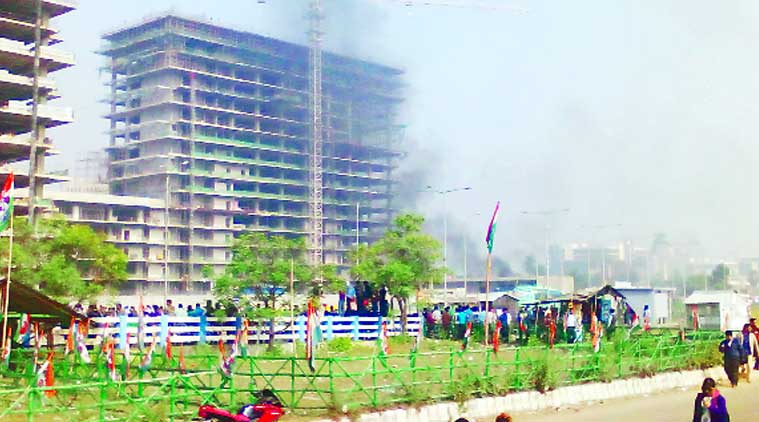Stay updated with the latest - Click here to follow us on Instagram
5 km from summit venue, TMC men take part in labour agitation
The contractors and security guards at the site were assaulted and their vehicles set on fire.
 At the clash spot on Wednesday. (Source: Express photo)
At the clash spot on Wednesday. (Source: Express photo)
Around five km from the venue of the Bengal Global Business Summit, Trinamool workers and labourers — both local and migrant — went on a rampage Wednesday at the construction site of a Tata Consultancy Services (TCS) project building at New Town in Rajarhat.
The contractors and security guards at the site were assaulted and their vehicles set on fire. When the police resorted to lathicharge to control the mob, a couple of police vehicles were also set afire. The tension erupted over the death of a migrant labourer at the construction site on Tuesday.
This comes on a day when Chief Minister Mamata Banerjee was busy trying to convince industrialists that there was no labour unrest and no dearth of land for industry in the state. Significantly, TCS is the only IT major that has started its expansion in Bengal.
Though senior Trinamool leaders were tightlipped over the incident, sources close to Mamata said that the incident has made the CM “very upset”.
Local TMC MLA Sabyasachi Dutta, in charge of New Town-Rajarhat area, said: “We will look into the incident. This should not have happened. We are holding a meeting now. I have been informed that the labourers started an agitation that turned violent. Police and administrative officers have taken prompt action.”
Narayan Murmu, a 34-year-old tribal from Jharkhand, died on Tuesday around 11.45 am after he fell from the fourth storey underconstruction building. Murmu was rushed to the hospital in a TCS vehicle, but he died on way. His family was informed and labourers demanded compensation from the company.
Following this, TCS officials and contractors spoke to the labourers and the issue was reportedly sorted out, said police.
However, around 9 am on Wednesday, labourers were joined by hundreds of outsiders — including men from some syndicates of local Trinamool leaders. These syndicates supply construction material and local labourers to the site — which falls under Pathureghata panchayat ruled by Trinamool.
The mob resisted security guards and indulged in stone pelting. The police rushed to the site — located near the New Town police station — and tried to hold a meeting with the locals. However, the mob turned violent and attacked the police. The police resorted to lathicharge when the mob set company and police vehicles on fire.
Local TMC leader Hussain Ali said: “Things were almost settled yesterday. I told the locals to be patient and everything would be handled. Today morning, I received a call from a local labour supplier. I rushed to the spot. But things went out of control. They set my bike on fire.”
Police said while 2,880 labourers work at the site, at least 5,000 people stormed it on Wednesday. “We are trying to ascertain how many outsiders were there. We have started identifying witnesses and taking their statement… The situation went out of control as some local leaders demanded more compensation. The incident was fuelled by local labour suppliers,” said a senior police officer.
A case of rioting and arson has been lodged. “We have started investigation. People started agitating over the death and vandalised some properties at the site. The police had to act and we did. In a couple of hours, we brought the situation under control,” said ACP (Airport) V S R Ananthnag.
In a statement, TCS on Wednesday said: “We are deeply saddened by this loss of life. Our Rajarhat campus is being managed by United Joint Venture. Their officials are looking into the incident and they will do all the needful as per their policies.”
Why TCS matters
TCS is the largest employer in the IT sector in Bengal. The company has several campuses in the city and employs 28,000 people. It has invested Rs 1,350 crore at the Rajarhat campus, where the agitation took place. The first phase of the project is complete. The second phase in ongoing and is expected to employ 20,000. The project, work for which started in December, 2012, is being constructed on 40 acres of land.







